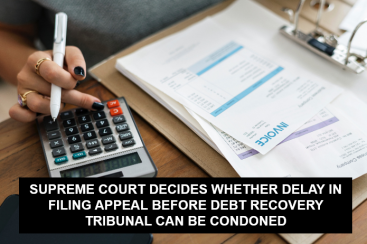SUPREME COURT DECIDES WHETHER DELAY IN FILING APPEAL BEFORE DEBT RECOVERY TRIBUNAL CAN BE CONDONED
In a recent case of Avneesh Chandan Gadgil and Another vs Oriental Bank of Commerce and Others Civil Appeal No. 6898 of 2021, a two Judge Bench of the #SupremeCourt comprising of J. M.R. Shah and J. Sanjiv Khanna passed a #Judgment dated 24-11-2021 on the issue, whether #delay in filing #appeal under the #Recovery of #Debts due to #Banks and #FinancialInstitutions Act, 1993 (1993 Act) before the Debt Recovery Tribunal-I (#DRT) can be condoned.
In this case, an Appeal was initially filed by Oriental Bank of Commerce, the Respondent herein, before the DRT against an Order dated 14-07-2011 passed by a Recovery Officer.
The said Appeal was filed by the Respondent-Bank beyond the period of limitation of 30 days as stipulated in Section 30 of the 1993 Act, with a prayer to condone the delay in filing the Appeal. The DRT condoned such delay by applying Section 5 of the Limitation Act, 1963, (Limitation Act), vide Order dated 05-06-2014. The relevant provisions are reproduced below for easy reference:
Section 30 of the 1993 Act: Appeal against the order of Recovery Officer
(1) Notwithstanding anything contained in section 29, any person aggrieved by an order of the Recovery Officer made under this Act may, within thirty days from the date on which a copy of the order is issued to him, prefer an appeal to the Tribunal.
(2) On receipt of an appeal under sub-section (1), the Tribunal may, after giving an opportunity to the appellant to be heard, and after making such inquiry as it deems fit, confirm, modify or set aside the order made by the Recovery Officer in exercise of his powers under sections 25 to 28 (both inclusive).
Section 5 of the Limitation Act: Extension of prescribed period in certain cases
Any appeal or any application, other than an application under any of the provisions of Order XXI of the Code of Civil Procedure, 1908 (5 of 1908), may be admitted after the prescribed period if the appellant or the applicant satisfies the court that he had sufficient cause for not preferring the appeal or making the application within such period.
Explanation.—The fact that the appellant or the applicant was missed by any order, practice or judgment of the High Court in ascertaining or computing the prescribed period may be sufficient cause within the meaning of this section.
Aggrieved by the Order dated 05-06-2014 passed by the DRT in favor of the Respondent-Bank, the Appellants herein filed an Appeal before Debts Recovery Appellate Tribunal (DRAT). The DRAT passed an Order dated 18-11-2014 and set aside the Order dated 05-06-2014 passed by the DRT on the ground that Section 5 of the Limitation Act won’t apply to an Appeal filed before DRT against the Order passed by the Recovery Officer.
Aggrieved by the Order dated 18-11-2014 passed by the DRAT in favor of the Appellants herein, the Respondent-Bank filed a Writ Petition before the Delhi High Court (High Court). The High Court passed an Order dated 16-02-2016 and held that the Limitation Act would apply to Appeals under the 1993 Act and that delay in filing Appeals can be condoned. Hence, the High Court quashed the DRAT Order dated 18-11-2014 and restored the DRT Order dated 05-06-2014 condoning delay in filing the Appeal before DRT by Respondent-Bank.
Aggrieved by the Order dated 16-02-2016 passed by the Delhi High Court in favor of the Respondent-Bank, the Appellants herein filed an Appeal before the Supreme Court. The Apex Court passed a Judgment dated 24-11-2021 and made the following observations in this case:
1) That DRT and DRAT have been set up by the Central Government under the 1993 Act for expeditious adjudication and recovery of debts due to banks and financial institutions. Whereas, Recovery Officers are officers appointed by the Central Government under the 1993 Act for recovery of debts ordered by DRT.
2) That Section 24 of the 1993 Act provides that Limitation Act is applicable only in respect of proceedings originating from ‘Application made to a Tribunal’ under Section 19 of the 1993 Act. Application under Section 19 of the 1993 Act are made to a DRT by banks or financial institutions for recovery of debt from any person. The relevant provision is reproduced below for easy reference:
Section 24. Limitation.—The provisions of the Limitation Act, 1963 (36 of 1963), shall, as far as may be, apply to an application made to a Tribunal.
3) As provisions of the Limitation Act are only applicable to applications made by banks, etc to DRT under Section 19 of the 1993 Act, hence, the Limitation Act won’t apply to appeals filed before DRT against orders of the Recovery Officer.
Thus, the Supreme Court held that in the present case, the delay in filing the Appeal before DRT against the Order of the Recovery Officer dated 14-07-2011 cannot be condoned under Section 5 of the Limitation Act. As a result, the Apex Court restored the DRAT Order dated 18-11-2014 and set aside the High Court Order dated 16-02-2016 and DRT Order dated 05-06-2014 that condoned delay in filing Appeal.
Harini Daliparthy
Senior Legal Associate
The Indian Lawyer
Edited by
Sushila Ram Varma
Chief Consultant and Editor
The Indian Lawyer





































Leave a Reply